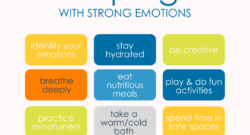Uncategorized
10 ways to support youth navigating the illness of a parent or caregiver
When a parent or caregiver gets sick, it affects the whole family, and young people often feel it the most. Youth may feel many different emotions, from sadness, to anger, to guilt, and even continued happiness; they might feel a shift in their family dynamics, and may find themselves having trouble concentrating on school or hobbies. By understanding what youth experience when a parent or caregiver is unwell, families, teachers, and communities can better support them.
Youth may typically experience the below when navigating the illness of a parent or caregiver:
Stress and Anxiety
When a parent is ill, youth often feel a mix of emotions like fear, sadness, anger, and guilt. They may also continue to feel joy and happiness despite this difficult time, which is not unusual. It’s normal when watching a parent or caregiver struggle to worry about what might happen in the future or to feel overwhelmed. This emotional strain can show up in mood swings, pulling away from friends, or changes in behavior. Youth may feel helpless, which can lead to more anxiety or sadness. Concerns about their family member’s health, family finances, or the future can weigh heavily on their mind.
Increased Responsibilities
When a parent or caregiver is sick, family roles may shift, and youth might find themselves having to take on new responsibilities. This could include looking after younger siblings, doing more chores, or even helping care for their sick parent or caregiver. For young adults already facing the challenges of growing up, this can feel especially tough. Some youth might handle these added duties well, but it can also lead to feeling burnt out, frustrated, or resentful while they’re needing to balance these responsibilities with school, activities, and friendships.
Academic Challenges
The stress and responsibilities at home can affect schoolwork. It’s common for grades to drop or for youth to lose interest in school. Youth may also find it hard to focus or miss classes because of their situation.
Social Isolation
Having a sick parent or caregiver can cause feelings of isolation, as youth may have a hard time connecting with friends or classmates who aren’t experiencing the same as they are. Youth may hesitate to talk about their situation for fear of being misunderstood. This isolation is especially hard as they may sometimes feel the need to skip out on social activities with their friends to support their sick parent or caregiver.
When a parent or caregiver is ill, it’s important for adults to provide support for young adults navigating their complex emotions and situations. Here are some ways adults can help:
1. Open Communication
- Encourage youth to express their feelings openly. Create a safe space where they feel comfortable sharing their fears, sadness, or any joy they might still experience.
- Listen actively without judgment, allowing them to vent or share their thoughts.
2. Validate Their Emotions
- Acknowledge that their feelings – whether it’s sadness, anger, or even moments of happiness – are normal and valid. Let them know it’s okay to feel a mix of emotions during tough times.
3. Offer Reassurance
- Remind them that it’s okay to feel helpless sometimes and that they are not alone. Let them know you’re there to support them through the challenges.
4. Provide Practical Support
- Help them manage responsibilities at home and at school. This might include assisting with chores, coordinating schedules, or offering to help with homework.
5. Encourage Social Connections
- Help them maintain friendships and social activities. Encourage them to spend time with friends, as these connections can provide a valuable support system.
6. Promote Healthy Coping Strategies
- Suggest activities that can help them cope with stress, such as exercise, art, or journaling. Encourage them to explore hobbies or interests that bring them joy.
7. Seek Professional Help
- If their emotions become overwhelming, encourage them to talk to a counselor or therapist. Professional support can provide tools for coping with their feelings.
- Peer support groups can be great resources for teens; they have the chance to meet others who are navigating the same experiences, relieving some feelings of isolation, learning coping strategies that have worked for others, and encouraging peer connection.
8. Be Patient and Understanding
- Recognize that mood swings or changes in behavior are part of the process. Offer support without pressure, and let them know you’re there whenever they need to talk or need help.
9. Model Self-Care
- Show the importance of self-care by practicing it yourself. Demonstrate healthy ways to manage stress and emotions, which can encourage teens to adopt similar habits.
10. Check-In Regularly
- Regularly check in with them about how they’re feeling and coping. Simple questions can show that you care and are there to support them.
By providing understanding and practical support, adults can help teens navigate the emotional challenges that come with a parent or caregiver’s illness, allowing them to feel less isolated and more empowered.
If you know a youth aged 13-23 who has a sick parent or caregiver, refer them to our online social community – Youth of Adult Patients (YAP) Island. It’s a space for them to connect with others who are navigating the same experience, and is completing monitored by child life specialists. Visit upopolis.com to refer them today!
Navigating Back-to-School Nerves: Tips for a Confident Start
The start of a new school year can evoke a wave of emotions for children and teens. While some experience the excitement of a new year looking forward to reuniting with friends and teachers, others may feel anxious and unsettled
about the many unknowns of what’s to come. These feelings are all normal and reflect the significant transition each new school year brings. Understanding and addressing these feelings can help create a smoother transition back to the
classroom.
The return to the classroom can feel unsettling for a number of reasons. There are changes in routines, new teachers, new classmates, social pressures of fitting in and stress of school work that can feel overwhelming for many. It’s
important to remember that you’re not alone in feeling anxious about returning to school; many kids and teens share similar concerns and fears.
Here are 5 tips to help support school age child(ren):
- Start adjusting bedtime and wake-up times a couple of weeks before school starts. Create a consistent morning routine, to help your child know what to expect each day.
- If possible, visit the school beforehand to familiarize your child with the school environment. Connect with their homeroom teacher, request a meet and greet before the first day.
- Have open discussions about their fears or concerns about their first day. Validate their emotions and let them know that these feelings are perfectly normal and that they’re not alone.
- Prepare for the first day together. Involve your child in picking out their outfits and school supplies.
- Teach your child about calming activities. Create a calm-down kit with items that help soothe them, like a favorite book or toy.
Here are 5 tips to navigate those back to school nerves (for teens):
- Talk it out. Share your feelings with a friend, family member or safe person.
- Identify school resources like counselors or clubs that can provide additional support.
- Practice self care. Get enough sleep, eat healthy, and engage in some form of regular physical activity leading up to, and during, school.
- Limit screen time! Set boundaries for social media use, especially before bedtime.
- Practice stress management techniques such as mindfulness, deep breathing, or journaling and utilize positive self- talk.
If you’re feeling anxious about returning to school, remember it is completely normal and those feelings are shared by many students. Finding support in a community and connecting with others navigating similar experiences can also be extremely helpful.
If you have any tips or strategies you find helpful, share them with our Upopolis community by visiting our social pages on Instagram (@upopolis) or Facebook (@upopolis) and sending us a message!
Navigating grief during summer: A teen’s guide
Summer vacation is supposed to be a time of fun, sun, and freedom! However, if you’re dealing with grief, it can feel like your sadness is increased during a time that should be so carefree. Whether you’ve lost a loved one, a pet, or are experiencing another form of loss (ie. moving, parental divorce etc), it’s important to remember that it’s okay to grieve, even when the world around you seems bright.
Here are a few tips to help you cope with grief during the summer months:
1. Acknowledge Your Feelings: It’s normal to feel a range of emotions when you’re grieving – sadness, anger, confusion, and even guilt. Allow yourself to experience these feelings without judgment. Talking to a trusted friend, family member, or adult can also provide an outlet for expressing what you’re going through.
2. Find Comfort in Routine: While summer often disrupts your usual schedule, maintaining some sense of routine can be comforting. Whether it’s sticking to a morning run, reading before bed, or spending time on a hobby you enjoy, having predictable activities can offer stability during a time that feels really stormy.
3. Get Outside: Summer offers the perfect opportunity to connect with nature, which can be incredibly soothing! Take walks in a nearby park, go for a swim at the beach, or simply sit outside and listen to the sounds of outside – birds chirping, waves crashing, or kids playing. Being in natural surroundings can provide a sense of peace.
4. Honor Your Loved One: Find ways to remember and honor the person, pet or thing you’ve lost. This might involve creating a memory book, planting a tree or garden in their honor, or participating in activities they loved. Celebrating their life can be a positive way to keep their memory alive.
5. Give Yourself Permission to Have Fun: It’s okay to enjoy yourself, even while grieving. Laughter and joy are not disrespectful to your feelings, although it sometimes may feel like it. Allow yourself to participate in summer activities that bring you happiness, whether it’s hanging out with friends, trying a new hobby, or going on an adventure.
6. Be Patient with Yourself: Healing takes time, and everyone grieves differently. Some days may be harder than others, and that’s okay. Be patient and gentle with yourself as you navigate through this process. It’s okay to take breaks when you need them and to ask for support when it feels overwhelming.
Remember, grief is a natural response to loss, and there’s no right or wrong way to experience it. By allowing yourself to feel your emotions, maintaining routines, connecting with nature, honoring your loved one, enjoying summer activities, and being kind to yourself, you can navigate grief during summer vacation with resilience and grace. You’re never alone in this journey!
If you’d like to meet other youth who are navigating grief, join our Grief Island. Send an e-mail to support@upopolis.com with the subject line “I want to join the Grief Island!” and we will help get you signed up.
Exciting Times Ahead: Embracing Change with Our Brand Refresh
Change is in the air here at Upopolis! We’re thrilled to unveil our refreshed brand identity, marking a new chapter in our 17 year journey.
A brand refresh isn’t just about updating visuals; it’s a bold statement of where we’ve been, and where we’re going. Ultimately, it’s our commitment to staying relevant with the teens and young adults who use our website, and the professionals who refer them to us. Our new logo is a representation of our dedication to connection. The three dots symbolize individuals coming together through our Islands and the larger Upopolis community.
Why the change? As we grow and adapt to new challenges and opportunities, we recognize the importance of aligning our brand with our vision for the future. This brand refresh is a reminder that Upopolis is a trusted and empowering online community for youth facing stressful life events, including grief and medical challenges. Upopolis is a safe space for connection, support and empowerment, with the goal of reducing social isolation and fostering resilience.
What can you expect? Beyond a fresh look, we are shifting our target audience to youth aged 13 to 23 across North America. We will continue to raise awareness about our free-of-charge programming to patients, parents, siblings and health professionals in this catchment area. Look out for our updated website which will be more user-friendly, resource-heavy, and an easy place to guide patients, parents and health professionals to find out more about Upopolis. Website updates will be announced in the coming months!
Thank you for being part of our story. We invite you to explore our new look, connect with us, and join us on this exciting journey forward. Together, let’s embrace change and write the next chapter of success for Uopolis!
Here’s to new beginnings and endless possibilities!



Youth Takeover: What I wish other people knew about living with a chronic illness
Jenna is a long-time member of Upopolis and a regular contributor to our blog post series. We appreciate and value everything she teaches us about being a young adult living with a chronic illness.
Today, she shares 5 things she wish others knew about living with a chronic illness. This is so insightful to those of us who don’t have a medical illness, as well as incredibly validating for those who do. Check out what she has to say:
1. The invisibility of an illness does not diminish its existence or impact. Invisible illnesses, often overlooked due to their lack of visible symptoms, can be just as debilitating as those with outward signs. Individuals including myself facing these conditions may struggle with daily challenges that go unnoticed, emphasizing the importance of empathy and understanding. Acknowledging the presence of invisible illnesses promotes a more compassionate and supportive approach to those dealing with such health issues.
2. The visibility or recognition of an illness does not determine its validity, and this holds true for individuals often referred to as “spoonies” who contend with chronic and invisible health conditions. Whether an illness is widely understood or remains unknown, the experiences and challenges faced by those dealing with chronic health issues are valid and significant. The term “spoonie” is often used to describe people managing conditions like fibromyalgia, lupus, or chronic fatigue syndrome, emphasizing the daily allocation of limited energy “spoons.” Recognizing and respecting the validity of these experiences promotes empathy and a more inclusive understanding of diverse health struggles.
3. When chronic illness warriors find themselves needing to cancel plans, it’s not an expression of dislike or a desire for isolation. Rather, it reflects the unpredictable nature of their health challenges. It’s crucial for friends and loved ones to continue extending invitations, engaging through FaceTime, and making efforts to foster a sense of inclusion. Chronic illness warriors appreciate gestures that make them feel loved and understood, such as learning their unique love languages. In doing so, relationships can thrive despite the challenges posed by chronic health conditions, reinforcing the importance of compassion and ongoing support.
4. Experiencing occasional colds or minor illnesses may provide insight into temporary discomfort, but it doesn’t equate to a full understanding of the complex and enduring challenges that come with chronic illnesses. Chronic conditions often involve persistent symptoms, fluctuating health, and long-term impacts on daily life. It’s essential to recognize the distinction between short-term ailments and the ongoing struggles faced by those with chronic health issues. Empathy and genuine understanding can only be cultivated through acknowledging the unique and sometimes invisible aspects of chronic illness experiences.
5. Choosing not to drink alcohol, whether due to health reasons or personal preferences, doesn’t diminish one’s coolness or ability to enjoy social gatherings. The decision to abstain from alcohol is a valid choice that deserves respect and understanding. Many still find joy in partying and dancing without the need for alcoholic beverages, embracing alternatives like delicious mocktails. Creating an inclusive environment where individuals feel validated in their sobriety fosters a more considerate and accepting social atmosphere, acknowledging the diversity of preferences and lifestyles.
Thank you to Jenna, and all our Upopolis members, who teach us something new every day!
Journal Prompts for Youth Experiencing Stressful Life Events
Journaling is often suggested as a way to cope with challenging life events, such as illness or grief. It offers many benefits for our mental, emotional and even physical well-being.
- Emotional expression: Documenting our thoughts and feelings is a healthy way to express emotions and reduce stress.
- Self-reflection: Journaling allows us to gain insight into our own thoughts and behaviours. When we reflect on our own experiences, we can better understand our responses to situations.
- Problem solving: Writing about our challenges or problems can help us brainstorm solutions and consider different perspectives.
- Gratitude: Identifying things we are grateful for can promote a positive outlook and feelings of happiness.
- Improved self-esteem: Taking the time to recognize our own accomplishments, strengths and positive experiences can boost self-confidence and self-esteem, since a journal is a tangible reminder of our achievements.
Over the past few months, the Upopolis Instagram page (@upopolis) has been sharing journal prompts for youth who are experiencing challenging life events, including youth with a medical illness, and youth with a parent or caregiver with a medical illness.
Today, we are sharing these journal prompts all in one place for easy access and BONUS, we have added journal prompts for youth who are grieving, and youth who have a brother or sister with a medical illness.
Check out the full list below, and be sure to save this article!
Journal Prompts for Youth with a Medical Illness
- Some coping strategies I can use during painful days or flare ups…
- Something that my medical illness has prevented me from doing is… Some ways I can try to make this happen are…
- Here are some goals I have despite my illness…
- How has this illness helped me become resilient?
- A time I felt proud of myself was when…
- Things in my life I can control…
Journal Prompts for Youth with a Parent/Caregiver with a Medical Illness
- Some coping strategies I can use during sad/frustrating days…
- If I could tell me parent/caregiver anything, I would tell them…
- What can I do to give myself more “me” time?
- How has this experience helped me become resilient?
- 5 good things about today…
- Things in my life I can control…
Journal Prompts for Youth who are Grieving
- A list of people I can go to for support, either in person or virtually…
- A memory of my person who has died that makes me cry is…
- A memory of my person who has died that makes me laugh…
- If you could tell the person who died about your day, what would you tell them?
- In my body, I feel grief… (where?) How does it make me feel?
Journal Prompts for Youth who have a Brother/Sister with a Medical Illness
- Today, I’m having a hard time with…
- Something I wish my support system could understand or help with is… Ways I could tell them about this are…
- Am I respecting my boundaries? Everything I want to say yes to is… and everything I want to say no to is…
- Sometimes I can’t control my sibling’s illness. However, some things I can control in my life are…
- What does a good day look like? What does a bad day look like? How can I add more good-day elements into my bad days?
Be sure to follow @upopolis on Instagram to get more coping tips and strategies like these journal prompts!
IT’S BACK! Virtual Camp for Youth with Cystic Fibrosis
We have an amazing virtual opportunity taking place July 8th – 12th for youth with cystic fibrosis!
Camp Maple Leaf and Upopolis are teaming up to provide youth living with cystic fibrosis from all across Canada the opportunity to participate in our virtual camp, “Camp Fromaway”! Last year was Camp Fromaway’s inaugural year, and it was a huge success. We can’t wait to do it again!
What is virtual camp?
It’s the experience of camp, but online!
Camp Fromaway provides youth aged 11-17 from across Canada who are living with cystic fibrosis, and their siblings, the opportunity to meet each other while participating in fun daily camp activities. Campers who register by April 30 will receive all activity supplies they need to participate.
The best part? Campers will meet others just like them! This will provide them with a sense of belonging, teach coping skills, and help reduce feelings of isolation often associated with chronic or medical illnesses.
How to register?
Applications for Camp Fromaway are will be accepted until April 30th, 2024 at the link:
https://forms.gle/SiciN6pnPg3fivz36
To receive a digital poster to print or e-mail to your patients/clients/students/families, e-mail support@upopolis.com – just ask for a Camp Fromaway poster.
What is Camp Maple Leaf?
Camp Maple Leaf is a not-for-profit sleepover camp for children of Canadian Military families and children living with unique challenges. Their sleepover camp provides children and families who share similar life experiences with a special place to call their own.
Upopolis and Camp Maple Leaf are on a mission to support youth going through challenging life events by connecting them with others through the camp experience. For more information, visit www.campmapleleaf.ca or e-mail support@upopolis.com.
Camp takes place July 8th – 12th from 12:00pm – 2:00pm EST. Can’t wait to see you there!
Coping with strong grief emotions
When someone you know dies, it can affect you and the people you know in many different ways. These changes can be very hard, so it can be helpful to find healthy ways to cope with strong emotions.
Here are 10 ways you can cope with all the strong emotions that come with grief:
- Learn the names of your emotions so you can better understand what you are feeling and share your emotions with someone else.
- Practice deep breathing and mindfulness activities (this can include lots of activities such as yoga, exploring the senses, spending time in nature, journaling, or doing arts and crafts).
- Move your body in ways that feel good for you, such as walking, dancing, or exercising.
- Eat meals that are full of good nutrients, and stay hydrated by drinking lots of water.
- Take a warm or cold bath/shower – whichever feels best for you.
- Find time to relax and rest your body, including sleeping.
- Engage in something creative such as music, art or dance.
- Play and do activities that you enjoy, every day if you can!
- Spend time in places that help you feel safe, calm, and comfortable. This can be your home, with friends or loved ones, or some place special to you.
- Talk with people you can trust and who really care for you.
Children’s Grief Awareness Day is on November 16 and was designed to help bring awareness to the needs of children and youth who are grieving. Click here to learn more: https://www.childrensgriefawarenessday.org/cgad2/index.shtml
7 Tips for Health Professionals who work with adolescent patients, from me! A Upopolis teen
I’m Jenna – a former pediatric patient, current adult patient, chronic illness advocate, veteran Upal, current Upopolis member, and a 19-year-old disabled queen. I want to share some valuable insights for healthcare providers on how to better support and communicate with teenagers.
It’s crucial to bridge the gap between treating teens like children and acknowledging that they are not quite adults yet, all while avoiding stigmatization and promoting a comfortable environment for their care. Here are a few tips for every professional who works with teenage patients who have a chronic or critical illness:
1. Respect Their Maturity: Teenagers, regardless of their medical condition, appreciate being treated with respect. It’s essential for healthcare providers to acknowledge their maturity and individuality. Try not to speak down to them or dismiss their feelings and concerns. Teens may not be adults, but they are capable of understanding their health conditions and making informed decisions.
2. Avoid Stigmatization: Teens are pretty cool, and they don’t want to be judged or stigmatized based on their age or appearance. Avoid making assumptions about their behavior or lifestyle choices. Be open-minded and supportive, recognizing that everyone’s journey is unique. Stigmatization only creates barriers to effective healthcare.
3. Offer Distraction and Support: For teenagers, undergoing medical procedures or facing chronic illnesses, distraction items, or offering support from a professional like a child life specialist, can be incredibly helpful. These professionals are skilled at providing emotional support and creative distractions that make the medical experience less intimidating. Whenever possible, involving them can ease the stress and anxiety teenagers may feel during their healthcare journey.
4. Address Body Image Issues: Body shaming has no place in healthcare. Teenagers, just like adults, can experience body image insecurities. When providing care, be mindful of your language and actions. Promote positive body image and self-acceptance. Encourage open conversations about body-related concerns, but always do so with empathy and sensitivity.
5. Be Kind and Empathetic: Kindness goes a long way, especially when working with teenagers facing health challenges. Showing empathy and compassion can make a significant difference in how teenagers perceive their healthcare experiences. Listen actively, validate their feelings, and offer emotional support. A little kindness can alleviate anxiety and foster trust.
6. Encourage Independence: While it’s important to provide guidance and support, empowering teenagers to take charge of their health is equally vital. Encourage them to ask questions, express their concerns, and actively participate in their treatment plans. By promoting independence, healthcare providers can help teens develop essential life skills for managing their health in the future.
7. Foster Communication: Effective communication is the cornerstone of quality healthcare. Ensure that teenagers have the opportunity to voice their opinions, ask questions, and participate in shared decision-making. Create a safe and non-judgmental environment for open dialogue, which can lead to better treatment adherence and overall well-being.
As a former pediatric patient, current adult patient, and chronic illness advocate, I can attest to the importance of healthcare providers following these guidelines when working with teenagers. It’s crucial to strike a balance between recognizing their maturity and providing age-appropriate care, avoiding stigmatization, and fostering a respectful, supportive environment. Distraction items, kindness, and empowerment are essential components of ensuring a positive healthcare experience for teenagers, regardless of their health challenges. By implementing these tips, healthcare providers can make a profound impact on the lives of their young patients, promoting their overall well-being and encouraging them to take an active role in their healthcare journey.








